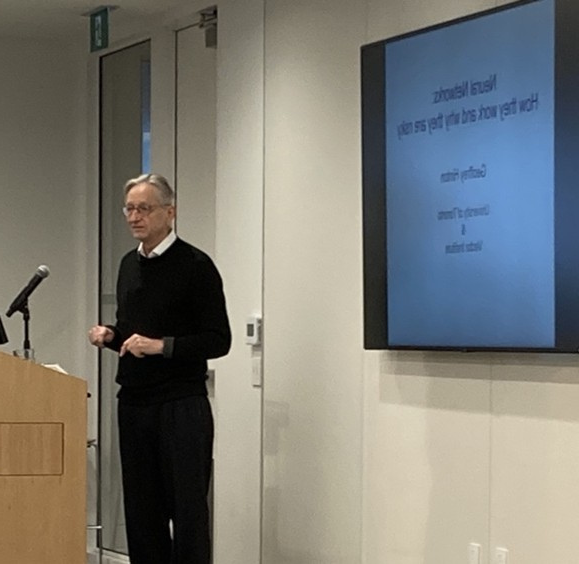Advancing AI in the Canadian Public Sector examines opportunities and challenges
The Munk School - Canada Public Service Accelerator
This January, the Munk School of Global Affairs and Public Policy hosted the Canada School of Public Service (CSPS) as part of a five-day Executive AI Learning Accelerator program. Government officials from six federal departments explored Toronto’s dynamic AI ecosystem, engaging directly with industry leaders and scholars to gain firsthand exposure to cutting-edge AI developments. The program fostered dialogue between government, academia, and the private sector, aiming to accelerate AI adoption in the public service by encouraging participants to propose AI-driven initiatives and develop pilot programs within their departments. Professor Janice Gross Stein, Founding Director of the Munk School of Global Affairs and Public Policy, highlighted the significance of such collaborations in shaping AI governance: “The AI Accelerator brings state-of-the-art knowledge to those in our government responsible for making and executing decisions about the future of advanced technologies in our societies. It is an example of how our universities can partner with government to share knowledge in real time.”
 The first day of the program immersed participants in Toronto’s thriving AI ecosystem, offering firsthand exposure to cutting-edge advancements in the field. Through site visits to leading AI and quantum computing firms, including Xanadu Quantum Technologies, Sanctuary AI, Cohere, and Blue J, government officials engaged directly with some of Canada’s top tech innovators, gaining insights into AI’s transformative potential. It also featured discussions on AI’s role in Canada, with thought leaders such as Janice Stein, John Stackhouse, Senior Vice-President at RBC, and Dr. Stephen Toope, President and CEO of the Canadian Institute for Advanced Research (CIFAR).
The first day of the program immersed participants in Toronto’s thriving AI ecosystem, offering firsthand exposure to cutting-edge advancements in the field. Through site visits to leading AI and quantum computing firms, including Xanadu Quantum Technologies, Sanctuary AI, Cohere, and Blue J, government officials engaged directly with some of Canada’s top tech innovators, gaining insights into AI’s transformative potential. It also featured discussions on AI’s role in Canada, with thought leaders such as Janice Stein, John Stackhouse, Senior Vice-President at RBC, and Dr. Stephen Toope, President and CEO of the Canadian Institute for Advanced Research (CIFAR).
 Building on these industry insights, the next day focused on broader implications of AI for public policy. Highlights included a visit to the Schwartz Reisman Institute, where 2024 Nobel Prize winner Dr. Geoffrey Hinton delivered a talk on the foundations of AI. This was followed by a visit to the Vector Institute and the MaRS Discovery District, both hubs of AI innovation and commercialization.
Building on these industry insights, the next day focused on broader implications of AI for public policy. Highlights included a visit to the Schwartz Reisman Institute, where 2024 Nobel Prize winner Dr. Geoffrey Hinton delivered a talk on the foundations of AI. This was followed by a visit to the Vector Institute and the MaRS Discovery District, both hubs of AI innovation and commercialization.
On days four and five, participants from the Federal Public Service returned to Ottawa for further workshops to contextualize AI innovation within the Government of Canada legal, policy, and infrastructure context. They analyzed possibilities and potential use cases, and designed questions required to implement AI projects. Six months post-program, CPPS participants will be working within organizations to design, develop and deliver one or more AI projects in each participating department.
A recurring theme was the need to align AI advancements with national priorities. Experts emphasized the critical role of public-private partnerships in bridging the gap between innovation and regulation, enhancing productivity and ensuring Canada’s global competitiveness in AI. With intense international competition, policymakers and industry leaders highlighted the need to support Canadian AI firms, strengthen AI talent pipelines, and invest in workforce upskilling and education to retain top talent.
The program also offered a unique learning opportunity for select Munk School Masters students, who gained firsthand exposure to the diverse perspectives of government officials and AI industry leaders. This experience deepened their understanding of AI’s evolving trajectory in Canada, highlighting both opportunities and challenges. With an emphasis on ethical AI development, cross-sector collaboration, and the importance of thoughtful policymaking, the program inspired students to pursue careers that drive innovation and shape Canada’s governance landscape.

